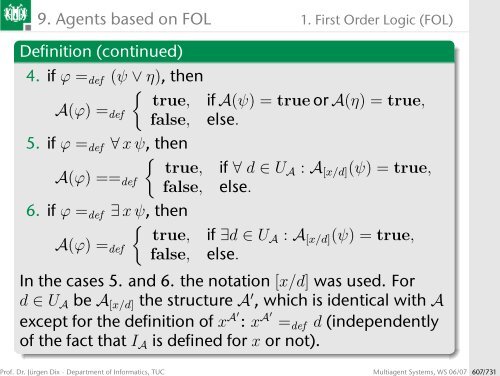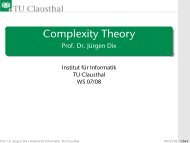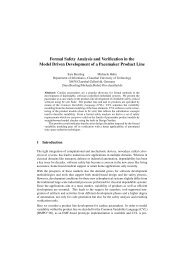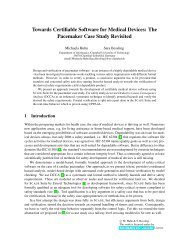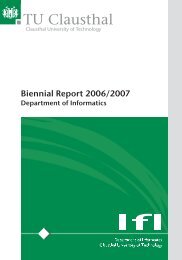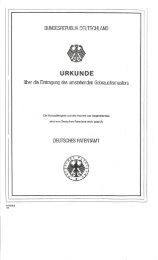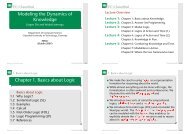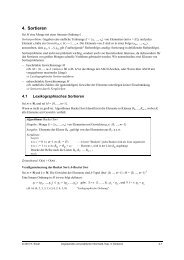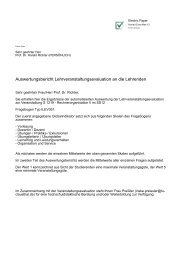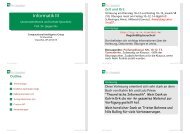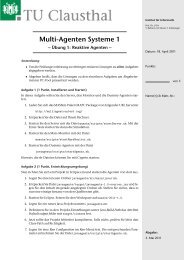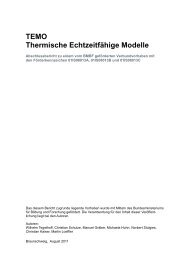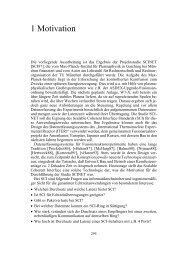- Page 1 and 2:
Prof. Dr. Jürgen Dix · Department
- Page 3 and 4:
Prof. Dr. Jürgen Dix · Department
- Page 5 and 6:
Prof. Dr. Jürgen Dix · Department
- Page 7 and 8:
Prof. Dr. Jürgen Dix · Department
- Page 9 and 10:
Prof. Dr. Jürgen Dix · Department
- Page 11 and 12:
Prof. Dr. Jürgen Dix · Department
- Page 13 and 14:
Prof. Dr. Jürgen Dix · Department
- Page 15 and 16:
Prof. Dr. Jürgen Dix · Department
- Page 17 and 18:
of. Dr. Jürgen Dix · Department o
- Page 19 and 20:
Prof. Dr. Jürgen Dix · Department
- Page 21 and 22:
Prof. Dr. Jürgen Dix · Department
- Page 23 and 24:
Prof. Dr. Jürgen Dix · Department
- Page 25 and 26:
Prof. Dr. Jürgen Dix · Department
- Page 27 and 28:
Prof. Dr. Jürgen Dix · Department
- Page 29 and 30:
Prof. Dr. Jürgen Dix · Department
- Page 31 and 32:
Prof. Dr. Jürgen Dix · Department
- Page 33 and 34:
Prof. Dr. Jürgen Dix · Department
- Page 35 and 36:
Prof. Dr. Jürgen Dix · Department
- Page 37 and 38:
Prof. Dr. Jürgen Dix · Department
- Page 39 and 40:
Prof. Dr. Jürgen Dix · Department
- Page 41 and 42:
Prof. Dr. Jürgen Dix · Department
- Page 43 and 44:
Prof. Dr. Jürgen Dix · Department
- Page 45 and 46:
Prof. Dr. Jürgen Dix · Department
- Page 47 and 48:
Prof. Dr. Jürgen Dix · Department
- Page 49 and 50:
of. Dr. Jürgen Dix · Department o
- Page 51 and 52:
Prof. Dr. Jürgen Dix · Department
- Page 53 and 54:
Prof. Dr. Jürgen Dix · Department
- Page 55 and 56:
Prof. Dr. Jürgen Dix · Department
- Page 57 and 58:
Prof. Dr. Jürgen Dix · Department
- Page 59 and 60:
Prof. Dr. Jürgen Dix · Department
- Page 61 and 62:
Prof. Dr. Jürgen Dix · Department
- Page 63 and 64:
1. Introduction 3. Formal Descripti
- Page 65 and 66:
of. Dr. Jürgen Dix · Department o
- Page 67 and 68:
Prof. Dr. Jürgen Dix · Department
- Page 69 and 70:
1. Introduction 3. Formal Descripti
- Page 71 and 72:
Prof. Dr. Jürgen Dix · Department
- Page 73 and 74:
Prof. Dr. Jürgen Dix · Department
- Page 75 and 76:
Prof. Dr. Jürgen Dix · Department
- Page 77 and 78:
Prof. Dr. Jürgen Dix · Department
- Page 79 and 80:
Prof. Dr. Jürgen Dix · Department
- Page 81 and 82:
Prof. Dr. Jürgen Dix · Department
- Page 83 and 84:
Prof. Dr. Jürgen Dix · Department
- Page 85 and 86:
Prof. Dr. Jürgen Dix · Department
- Page 87 and 88:
Prof. Dr. Jürgen Dix · Department
- Page 89 and 90:
of. Dr. Jürgen Dix · Department o
- Page 91 and 92:
Prof. Dr. Jürgen Dix · Department
- Page 93 and 94:
Prof. Dr. Jürgen Dix · Department
- Page 95 and 96:
Prof. Dr. Jürgen Dix · Department
- Page 97 and 98:
Prof. Dr. Jürgen Dix · Department
- Page 99 and 100:
Prof. Dr. Jürgen Dix · Department
- Page 101 and 102:
of. Dr. Jürgen Dix · Department o
- Page 103 and 104:
Prof. Dr. Jürgen Dix · Department
- Page 105 and 106:
2. Basic Architectures 2. BDI-Archi
- Page 107 and 108:
Prof. Dr. Jürgen Dix · Department
- Page 109 and 110:
Prof. Dr. Jürgen Dix · Department
- Page 111 and 112:
Prof. Dr. Jürgen Dix · Department
- Page 113 and 114:
Prof. Dr. Jürgen Dix · Department
- Page 115 and 116:
Prof. Dr. Jürgen Dix · Department
- Page 117 and 118:
Prof. Dr. Jürgen Dix · Department
- Page 119 and 120:
Prof. Dr. Jürgen Dix · Department
- Page 121 and 122:
Prof. Dr. Jürgen Dix · Department
- Page 123 and 124:
of. Dr. Jürgen Dix · Department o
- Page 125 and 126:
Prof. Dr. Jürgen Dix · Department
- Page 127 and 128:
of. Dr. Jürgen Dix · Department o
- Page 129 and 130:
Prof. Dr. Jürgen Dix · Department
- Page 131 and 132:
Prof. Dr. Jürgen Dix · Department
- Page 133 and 134:
Prof. Dr. Jürgen Dix · Department
- Page 135 and 136:
of. Dr. Jürgen Dix · Department o
- Page 137 and 138:
Prof. Dr. Jürgen Dix · Department
- Page 139 and 140:
Prof. Dr. Jürgen Dix · Department
- Page 141 and 142:
Prof. Dr. Jürgen Dix · Department
- Page 143 and 144:
Prof. Dr. Jürgen Dix · Department
- Page 145 and 146:
Prof. Dr. Jürgen Dix · Department
- Page 147 and 148:
Prof. Dr. Jürgen Dix · Department
- Page 149 and 150:
Prof. Dr. Jürgen Dix · Department
- Page 151 and 152:
2. Basic Architectures 3. AOP Prof.
- Page 153 and 154:
Prof. Dr. Jürgen Dix · Department
- Page 155 and 156:
Prof. Dr. Jürgen Dix · Department
- Page 157 and 158:
Prof. Dr. Jürgen Dix · Department
- Page 159 and 160:
Prof. Dr. Jürgen Dix · Department
- Page 161 and 162:
Prof. Dr. Jürgen Dix · Department
- Page 163 and 164:
Prof. Dr. Jürgen Dix · Department
- Page 165 and 166:
Prof. Dr. Jürgen Dix · Department
- Page 167 and 168:
Prof. Dr. Jürgen Dix · Department
- Page 169 and 170:
Prof. Dr. Jürgen Dix · Department
- Page 171 and 172:
Prof. Dr. Jürgen Dix · Department
- Page 173 and 174:
Prof. Dr. Jürgen Dix · Department
- Page 175 and 176:
Prof. Dr. Jürgen Dix · Department
- Page 177 and 178:
Prof. Dr. Jürgen Dix · Department
- Page 179 and 180:
Prof. Dr. Jürgen Dix · Department
- Page 181 and 182:
of. Dr. Jürgen Dix · Department o
- Page 183 and 184:
of. Dr. Jürgen Dix · Department o
- Page 185 and 186:
Prof. Dr. Jürgen Dix · Department
- Page 187 and 188:
Prof. Dr. Jürgen Dix · Department
- Page 189 and 190:
Prof. Dr. Jürgen Dix · Department
- Page 191 and 192:
of. Dr. Jürgen Dix · Department o
- Page 193 and 194:
of. Dr. Jürgen Dix · Department o
- Page 195 and 196:
Prof. Dr. Jürgen Dix · Department
- Page 197 and 198:
of. Dr. Jürgen Dix · Department o
- Page 199 and 200:
Prof. Dr. Jürgen Dix · Department
- Page 201 and 202:
Prof. Dr. Jürgen Dix · Department
- Page 203 and 204:
Prof. Dr. Jürgen Dix · Department
- Page 205 and 206:
Prof. Dr. Jürgen Dix · Department
- Page 207 and 208:
Prof. Dr. Jürgen Dix · Department
- Page 209 and 210:
of. Dr. Jürgen Dix · Department o
- Page 211 and 212:
Prof. Dr. Jürgen Dix · Department
- Page 213 and 214:
Prof. Dr. Jürgen Dix · Department
- Page 215 and 216:
Prof. Dr. Jürgen Dix · Department
- Page 217 and 218:
Prof. Dr. Jürgen Dix · Department
- Page 219 and 220:
Prof. Dr. Jürgen Dix · Department
- Page 221 and 222:
of. Dr. Jürgen Dix · Department o
- Page 223 and 224:
Prof. Dr. Jürgen Dix · Department
- Page 225 and 226:
Prof. Dr. Jürgen Dix · Department
- Page 227 and 228:
3. Decision Making (1) 3. (Im-) Per
- Page 229 and 230:
Prof. Dr. Jürgen Dix · Department
- Page 231 and 232:
Prof. Dr. Jürgen Dix · Department
- Page 233 and 234:
Prof. Dr. Jürgen Dix · Department
- Page 235 and 236:
Prof. Dr. Jürgen Dix · Department
- Page 237 and 238:
Prof. Dr. Jürgen Dix · Department
- Page 239 and 240:
Prof. Dr. Jürgen Dix · Department
- Page 241 and 242:
Prof. Dr. Jürgen Dix · Department
- Page 243 and 244:
Prof. Dr. Jürgen Dix · Department
- Page 245 and 246:
Prof. Dr. Jürgen Dix · Department
- Page 247 and 248:
of. Dr. Jürgen Dix · Department o
- Page 249 and 250:
Prof. Dr. Jürgen Dix · Department
- Page 251 and 252:
Prof. Dr. Jürgen Dix · Department
- Page 253 and 254:
Prof. Dr. Jürgen Dix · Department
- Page 255 and 256:
Prof. Dr. Jürgen Dix · Department
- Page 257 and 258:
Prof. Dr. Jürgen Dix · Department
- Page 259 and 260:
Prof. Dr. Jürgen Dix · Department
- Page 261 and 262:
Prof. Dr. Jürgen Dix · Department
- Page 263 and 264:
Prof. Dr. Jürgen Dix · Department
- Page 265 and 266:
Prof. Dr. Jürgen Dix · Department
- Page 267 and 268:
Prof. Dr. Jürgen Dix · Department
- Page 269 and 270:
Prof. Dr. Jürgen Dix · Department
- Page 271 and 272:
Prof. Dr. Jürgen Dix · Department
- Page 273 and 274:
Prof. Dr. Jürgen Dix · Department
- Page 275 and 276:
Prof. Dr. Jürgen Dix · Department
- Page 277 and 278:
Prof. Dr. Jürgen Dix · Department
- Page 279 and 280:
Prof. Dr. Jürgen Dix · Department
- Page 281 and 282:
Prof. Dr. Jürgen Dix · Department
- Page 283 and 284:
of. Dr. Jürgen Dix · Department o
- Page 285 and 286:
Prof. Dr. Jürgen Dix · Department
- Page 287 and 288:
of. Dr. Jürgen Dix · Department o
- Page 289 and 290:
Prof. Dr. Jürgen Dix · Department
- Page 291 and 292:
Prof. Dr. Jürgen Dix · Department
- Page 293 and 294:
of. Dr. Jürgen Dix · Department o
- Page 295 and 296:
Prof. Dr. Jürgen Dix · Department
- Page 297 and 298:
Prof. Dr. Jürgen Dix · Department
- Page 299 and 300:
Prof. Dr. Jürgen Dix · Department
- Page 301 and 302:
Prof. Dr. Jürgen Dix · Department
- Page 303 and 304:
Prof. Dr. Jürgen Dix · Department
- Page 305 and 306:
of. Dr. Jürgen Dix · Department o
- Page 307 and 308:
Prof. Dr. Jürgen Dix · Department
- Page 309 and 310:
Prof. Dr. Jürgen Dix · Department
- Page 311 and 312:
Prof. Dr. Jürgen Dix · Department
- Page 313 and 314:
Prof. Dr. Jürgen Dix · Department
- Page 315 and 316:
Prof. Dr. Jürgen Dix · Department
- Page 317 and 318:
of. Dr. Jürgen Dix · Department o
- Page 319 and 320:
Prof. Dr. Jürgen Dix · Department
- Page 321 and 322:
of. Dr. Jürgen Dix · Department o
- Page 323 and 324:
Prof. Dr. Jürgen Dix · Department
- Page 325 and 326:
Prof. Dr. Jürgen Dix · Department
- Page 327 and 328:
of. Dr. Jürgen Dix · Department o
- Page 329 and 330:
Prof. Dr. Jürgen Dix · Department
- Page 331 and 332:
Prof. Dr. Jürgen Dix · Department
- Page 333 and 334:
Prof. Dr. Jürgen Dix · Department
- Page 335 and 336:
Prof. Dr. Jürgen Dix · Department
- Page 337 and 338:
Prof. Dr. Jürgen Dix · Department
- Page 339 and 340:
of. Dr. Jürgen Dix · Department o
- Page 341 and 342:
Prof. Dr. Jürgen Dix · Department
- Page 343 and 344:
Prof. Dr. Jürgen Dix · Department
- Page 345 and 346:
Prof. Dr. Jürgen Dix · Department
- Page 347 and 348:
Prof. Dr. Jürgen Dix · Department
- Page 349 and 350:
Prof. Dr. Jürgen Dix · Department
- Page 351 and 352:
Prof. Dr. Jürgen Dix · Department
- Page 353 and 354:
Prof. Dr. Jürgen Dix · Department
- Page 355 and 356:
Prof. Dr. Jürgen Dix · Department
- Page 357 and 358:
of. Dr. Jürgen Dix · Department o
- Page 359 and 360:
Prof. Dr. Jürgen Dix · Department
- Page 361 and 362:
Prof. Dr. Jürgen Dix · Department
- Page 363 and 364:
of. Dr. Jürgen Dix · Department o
- Page 365 and 366:
of. Dr. Jürgen Dix · Department o
- Page 367 and 368:
Prof. Dr. Jürgen Dix · Department
- Page 369 and 370:
Prof. Dr. Jürgen Dix · Department
- Page 371 and 372:
of. Dr. Jürgen Dix · Department o
- Page 373 and 374:
Prof. Dr. Jürgen Dix · Department
- Page 375 and 376:
Prof. Dr. Jürgen Dix · Department
- Page 377 and 378:
of. Dr. Jürgen Dix · Department o
- Page 379 and 380:
of. Dr. Jürgen Dix · Department o
- Page 381 and 382:
Prof. Dr. Jürgen Dix · Department
- Page 383 and 384:
of. Dr. Jürgen Dix · Department o
- Page 385 and 386:
Prof. Dr. Jürgen Dix · Department
- Page 387 and 388:
of. Dr. Jürgen Dix · Department o
- Page 389 and 390:
of. Dr. Jürgen Dix · Department o
- Page 391 and 392:
Prof. Dr. Jürgen Dix · Department
- Page 393 and 394:
Prof. Dr. Jürgen Dix · Department
- Page 395 and 396:
of. Dr. Jürgen Dix · Department o
- Page 397 and 398:
Prof. Dr. Jürgen Dix · Department
- Page 399 and 400:
Prof. Dr. Jürgen Dix · Department
- Page 401 and 402:
Prof. Dr. Jürgen Dix · Department
- Page 403 and 404:
Prof. Dr. Jürgen Dix · Department
- Page 405 and 406:
Prof. Dr. Jürgen Dix · Department
- Page 407 and 408:
Prof. Dr. Jürgen Dix · Department
- Page 409 and 410:
of. Dr. Jürgen Dix · Department o
- Page 411 and 412:
of. Dr. Jürgen Dix · Department o
- Page 413 and 414:
¤ ¢ £ ¡ ¡ ¢ ¤ £ ¡ £ ¤ Pr
- Page 415 and 416:
Prof. Dr. Jürgen Dix · Department
- Page 417 and 418:
Prof. Dr. Jürgen Dix · Department
- Page 419 and 420:
of. Dr. Jürgen Dix · Department o
- Page 421 and 422:
Prof. Dr. Jürgen Dix · Department
- Page 423 and 424:
Prof. Dr. Jürgen Dix · Department
- Page 425 and 426:
6. Propositional Logic 3. Sudoku Si
- Page 427 and 428:
Prof. Dr. Jürgen Dix · Department
- Page 429 and 430:
Prof. Dr. Jürgen Dix · Department
- Page 431 and 432:
Prof. Dr. Jürgen Dix · Department
- Page 433 and 434:
Prof. Dr. Jürgen Dix · Department
- Page 435 and 436:
6. Propositional Logic 3. Sudoku Se
- Page 437 and 438:
Prof. Dr. Jürgen Dix · Department
- Page 439 and 440:
Prof. Dr. Jürgen Dix · Department
- Page 441 and 442:
Prof. Dr. Jürgen Dix · Department
- Page 443 and 444:
Prof. Dr. Jürgen Dix · Department
- Page 445 and 446:
Prof. Dr. Jürgen Dix · Department
- Page 447 and 448:
Prof. Dr. Jürgen Dix · Department
- Page 449 and 450:
Prof. Dr. Jürgen Dix · Department
- Page 451 and 452:
Prof. Dr. Jürgen Dix · Department
- Page 453 and 454:
Prof. Dr. Jürgen Dix · Department
- Page 455 and 456:
Prof. Dr. Jürgen Dix · Department
- Page 457 and 458:
Prof. Dr. Jürgen Dix · Department
- Page 459 and 460:
of. Dr. Jürgen Dix · Department o
- Page 461 and 462:
Prof. Dr. Jürgen Dix · Department
- Page 463 and 464:
¤ ¢ £ ¡ ¡ £ ¤ Prof. Dr. Jür
- Page 465 and 466:
Prof. Dr. Jürgen Dix · Department
- Page 467 and 468:
Prof. Dr. Jürgen Dix · Department
- Page 469 and 470:
of. Dr. Jürgen Dix · Department o
- Page 471 and 472:
Prof. Dr. Jürgen Dix · Department
- Page 473 and 474:
Prof. Dr. Jürgen Dix · Department
- Page 475 and 476:
Prof. Dr. Jürgen Dix · Department
- Page 477 and 478:
of. Dr. Jürgen Dix · Department o
- Page 479 and 480:
Prof. Dr. Jürgen Dix · Department
- Page 481 and 482:
Prof. Dr. Jürgen Dix · Department
- Page 483 and 484:
Prof. Dr. Jürgen Dix · Department
- Page 485 and 486:
of. Dr. Jürgen Dix · Department o
- Page 487 and 488:
Prof. Dr. Jürgen Dix · Department
- Page 489 and 490:
of. Dr. Jürgen Dix · Department o
- Page 491 and 492:
Prof. Dr. Jürgen Dix · Department
- Page 493 and 494:
Prof. Dr. Jürgen Dix · Department
- Page 495 and 496:
Prof. Dr. Jürgen Dix · Department
- Page 497 and 498:
Prof. Dr. Jürgen Dix · Department
- Page 499 and 500:
Prof. Dr. Jürgen Dix · Department
- Page 501 and 502:
Prof. Dr. Jürgen Dix · Department
- Page 503 and 504:
Prof. Dr. Jürgen Dix · Department
- Page 505 and 506:
Prof. Dr. Jürgen Dix · Department
- Page 507 and 508:
Prof. Dr. Jürgen Dix · Department
- Page 509 and 510:
Prof. Dr. Jürgen Dix · Department
- Page 511 and 512:
Prof. Dr. Jürgen Dix · Department
- Page 513 and 514:
Prof. Dr. Jürgen Dix · Department
- Page 515 and 516:
Prof. Dr. Jürgen Dix · Department
- Page 517 and 518:
Prof. Dr. Jürgen Dix · Department
- Page 519 and 520:
Prof. Dr. Jürgen Dix · Department
- Page 521 and 522:
Prof. Dr. Jürgen Dix · Department
- Page 523 and 524:
Prof. Dr. Jürgen Dix · Department
- Page 525 and 526:
Prof. Dr. Jürgen Dix · Department
- Page 527 and 528:
Prof. Dr. Jürgen Dix · Department
- Page 529 and 530:
Prof. Dr. Jürgen Dix · Department
- Page 531 and 532:
Prof. Dr. Jürgen Dix · Department
- Page 533 and 534:
Prof. Dr. Jürgen Dix · Department
- Page 535 and 536:
Prof. Dr. Jürgen Dix · Department
- Page 537 and 538:
Prof. Dr. Jürgen Dix · Department
- Page 539 and 540:
Prof. Dr. Jürgen Dix · Department
- Page 541 and 542:
Prof. Dr. Jürgen Dix · Department
- Page 543 and 544:
Prof. Dr. Jürgen Dix · Department
- Page 545 and 546:
Prof. Dr. Jürgen Dix · Department
- Page 547 and 548:
Prof. Dr. Jürgen Dix · Department
- Page 549 and 550:
Prof. Dr. Jürgen Dix · Department
- Page 551 and 552:
of. Dr. Jürgen Dix · Department o
- Page 553 and 554:
Prof. Dr. Jürgen Dix · Department
- Page 555 and 556: of. Dr. Jürgen Dix · Department o
- Page 557 and 558: Prof. Dr. Jürgen Dix · Department
- Page 559 and 560: Prof. Dr. Jürgen Dix · Department
- Page 561 and 562: Prof. Dr. Jürgen Dix · Department
- Page 563 and 564: Prof. Dr. Jürgen Dix · Department
- Page 565 and 566: Prof. Dr. Jürgen Dix · Department
- Page 567 and 568: Prof. Dr. Jürgen Dix · Department
- Page 569 and 570: of. Dr. Jürgen Dix · Department o
- Page 571 and 572: Prof. Dr. Jürgen Dix · Department
- Page 573 and 574: of. Dr. Jürgen Dix · Department o
- Page 575 and 576: Prof. Dr. Jürgen Dix · Department
- Page 577 and 578: Prof. Dr. Jürgen Dix · Department
- Page 579 and 580: Prof. Dr. Jürgen Dix · Department
- Page 581 and 582: Prof. Dr. Jürgen Dix · Department
- Page 583 and 584: Prof. Dr. Jürgen Dix · Department
- Page 585 and 586: Prof. Dr. Jürgen Dix · Department
- Page 587 and 588: Prof. Dr. Jürgen Dix · Department
- Page 589 and 590: Prof. Dr. Jürgen Dix · Department
- Page 591 and 592: Prof. Dr. Jürgen Dix · Department
- Page 593 and 594: Prof. Dr. Jürgen Dix · Department
- Page 595 and 596: Prof. Dr. Jürgen Dix · Department
- Page 597 and 598: Prof. Dr. Jürgen Dix · Department
- Page 599 and 600: 9. Agents based on FOL 1. First Ord
- Page 601 and 602: Prof. Dr. Jürgen Dix · Department
- Page 603 and 604: of. Dr. Jürgen Dix · Department o
- Page 605: Prof. Dr. Jürgen Dix · Department
- Page 609 and 610: 9. Agents based on FOL 1. First Ord
- Page 611 and 612: Prof. Dr. Jürgen Dix · Department
- Page 613 and 614: Prof. Dr. Jürgen Dix · Department
- Page 615 and 616: Prof. Dr. Jürgen Dix · Department
- Page 617 and 618: Prof. Dr. Jürgen Dix · Department
- Page 619 and 620: Prof. Dr. Jürgen Dix · Department
- Page 621 and 622: Prof. Dr. Jürgen Dix · Department
- Page 623 and 624: Prof. Dr. Jürgen Dix · Department
- Page 625 and 626: Prof. Dr. Jürgen Dix · Department
- Page 627 and 628: Prof. Dr. Jürgen Dix · Department
- Page 629 and 630: Prof. Dr. Jürgen Dix · Department
- Page 631 and 632: Prof. Dr. Jürgen Dix · Department
- Page 633 and 634: of. Dr. Jürgen Dix · Department o
- Page 635 and 636: Prof. Dr. Jürgen Dix · Department
- Page 637 and 638: Prof. Dr. Jürgen Dix · Department
- Page 639 and 640: Prof. Dr. Jürgen Dix · Department
- Page 641 and 642: Prof. Dr. Jürgen Dix · Department
- Page 643 and 644: Prof. Dr. Jürgen Dix · Department
- Page 645 and 646: Prof. Dr. Jürgen Dix · Department
- Page 647 and 648: Prof. Dr. Jürgen Dix · Department
- Page 649 and 650: Prof. Dr. Jürgen Dix · Department
- Page 651 and 652: Prof. Dr. Jürgen Dix · Department
- Page 653 and 654: Prof. Dr. Jürgen Dix · Department
- Page 655 and 656: Prof. Dr. Jürgen Dix · Department
- Page 657 and 658:
9. Agents based on FOL 4. (Con-)Gol
- Page 659 and 660:
Prof. Dr. Jürgen Dix · Department
- Page 661 and 662:
Prof. Dr. Jürgen Dix · Department
- Page 663 and 664:
Prof. Dr. Jürgen Dix · Department
- Page 665 and 666:
Prof. Dr. Jürgen Dix · Department
- Page 667 and 668:
Prof. Dr. Jürgen Dix · Department
- Page 669 and 670:
Prof. Dr. Jürgen Dix · Department
- Page 671 and 672:
Prof. Dr. Jürgen Dix · Department
- Page 673 and 674:
of. Dr. Jürgen Dix · Department o
- Page 675 and 676:
Prof. Dr. Jürgen Dix · Department
- Page 677 and 678:
of. Dr. Jürgen Dix · Department o
- Page 679 and 680:
of. Dr. Jürgen Dix · Department o
- Page 681 and 682:
Prof. Dr. Jürgen Dix · Department
- Page 683 and 684:
Prof. Dr. Jürgen Dix · Department
- Page 685 and 686:
of. Dr. Jürgen Dix · Department o
- Page 687 and 688:
Prof. Dr. Jürgen Dix · Department
- Page 689 and 690:
of. Dr. Jürgen Dix · Department o
- Page 691 and 692:
Prof. Dr. Jürgen Dix · Department
- Page 693 and 694:
Prof. Dr. Jürgen Dix · Department
- Page 695 and 696:
of. Dr. Jürgen Dix · Department o
- Page 697 and 698:
of. Dr. Jürgen Dix · Department o
- Page 699 and 700:
Situation independent functions dec
- Page 701 and 702:
Prof. Dr. Jürgen Dix · Department
- Page 703 and 704:
Prof. Dr. Jürgen Dix · Department
- Page 705 and 706:
Prof. Dr. Jürgen Dix · Department
- Page 707 and 708:
Prof. Dr. Jürgen Dix · Department
- Page 709 and 710:
Prof. Dr. Jürgen Dix · Department
- Page 711 and 712:
Prof. Dr. Jürgen Dix · Department
- Page 713 and 714:
Prof. Dr. Jürgen Dix · Department
- Page 715 and 716:
Prof. Dr. Jürgen Dix · Department
- Page 717 and 718:
Prof. Dr. Jürgen Dix · Department
- Page 719 and 720:
Prof. Dr. Jürgen Dix · Department
- Page 721 and 722:
Prof. Dr. Jürgen Dix · Department
- Page 723 and 724:
Prof. Dr. Jürgen Dix · Department
- Page 725 and 726:
Prof. Dr. Jürgen Dix · Department
- Page 727 and 728:
Prof. Dr. Jürgen Dix · Department
- Page 729 and 730:
Prof. Dr. Jürgen Dix · Department
- Page 731:
9. Agents based on FOL 7. Reference


